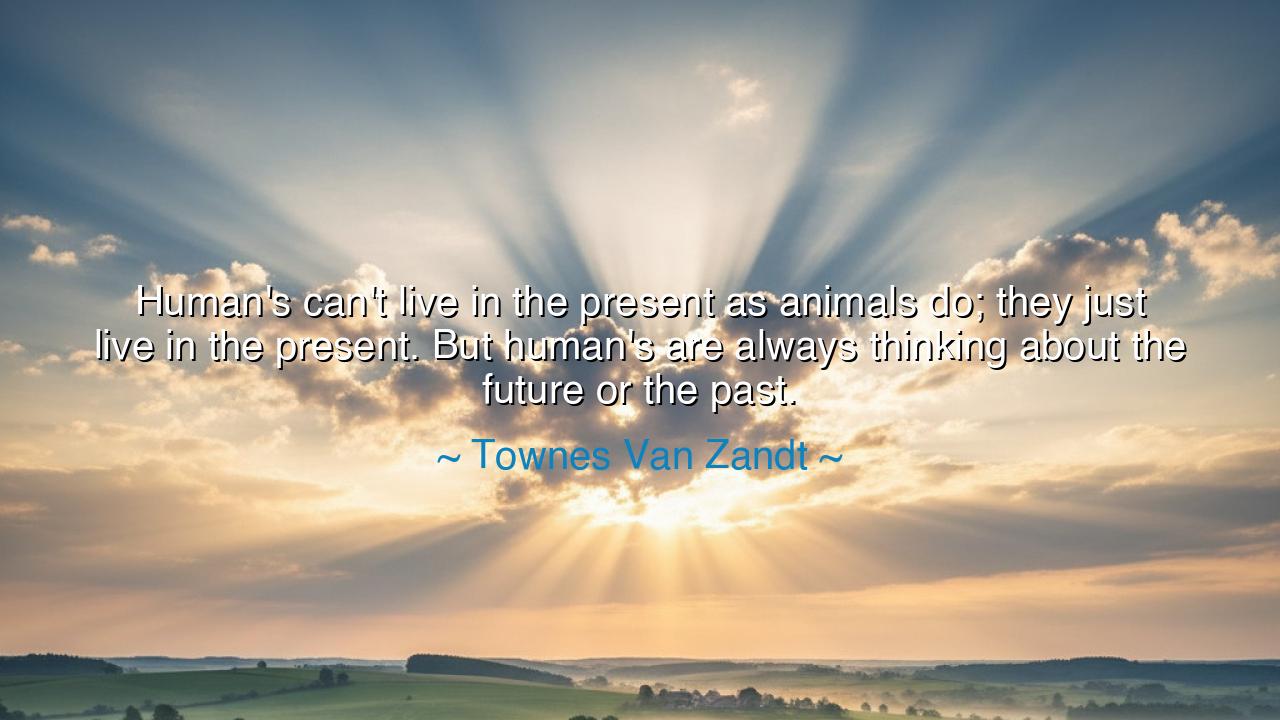
Human's can't live in the present as animals do; they just live
Human's can't live in the present as animals do; they just live in the present. But human's are always thinking about the future or the past.






"Humans can't live in the present as animals do; they just live in the present. But humans are always thinking about the future or the past." With these words, Townes Van Zandt reveals a profound truth about the nature of humanity—our tendency to dwell in the realm of time, forever torn between the shadows of what has been and the uncertainty of what is yet to come. Unlike the animals who live in the pure immediacy of the moment, human beings seem burdened by the past and the future. We are creatures of memory and anticipation, constantly wrestling with what was and what might be, often losing the beauty of the present in the process.
In the ancient world, the philosophers observed this same condition in humanity. Socrates urged that we must "know ourselves," and in that knowledge, learn to understand the fleeting nature of time. The ancient Greeks were keenly aware of the tension between the impermanence of life and the allure of eternity. Yet, many philosophers, especially the Stoics, like Marcus Aurelius, spoke of the importance of focusing on the present moment, reminding us that the future is uncertain and the past cannot be changed. The Stoics believed that true wisdom lay in accepting the present as it is, without allowing the thoughts of past regrets or future anxieties to cloud our judgment.
Van Zandt’s insight into human nature echoes this timeless struggle. While animals, in their simplicity, live purely in the now, humans are cursed with the gift of consciousness, and it is this very gift that leads us to obsess over the past and the future. Memory weighs heavily upon us, as we carry the burden of what we have lost or regretted, while anticipation constantly pulls us into an unknown future. Unlike animals, who are guided by instinct, we are guided by the mind, and it is our minds that trap us in a perpetual state of distraction.
Consider the life of Alexander the Great, whose military conquests brought him fame and power, yet his mind was always pulled between the past and the future. In his quest to build an empire, he often looked to the past, at the great civilizations that had come before him, and wondered how his own legacy would be remembered. At the same time, his eyes were fixed on the future—on the lands he had yet to conquer. Despite his extraordinary achievements, Alexander's mind was often restless, caught between reflection and ambition, unable to fully embrace the present moment. This struggle between what has been and what could be was a constant companion in his life, and it is a struggle that we, too, face.
In our modern world, this tendency to live in the past or future is even more pronounced. We spend much of our time either dwelling on past mistakes or fearing the uncertainties that lie ahead. In doing so, we miss the richness of the now. As Van Zandt said, humans cannot live in the present as animals do because our minds pull us in opposite directions. Fearing the future, we lose the opportunity to experience the joy and peace that the present offers. And in regretting the past, we rob ourselves of the freedom to embrace the life that is unfolding before us.
The lesson we can take from this observation is simple yet profound: learn to live in the present. Just as the Stoics taught, we must train our minds to focus on the here and now, to find peace in the fleeting moment and to let go of the weight of past burdens and future anxieties. The past is gone, and the future is uncertain. Only the present, this moment, is real. As Buddha taught, the key to enlightenment lies not in the endless pursuit of what comes next, but in the ability to truly be present, to fully experience life as it unfolds.
Thus, let us embrace this wisdom: stop chasing the future and reliving the past. The true richness of life exists in the present moment. Just as the ancients understood, let us turn our attention away from the distractions of time and focus on the beauty that is before us right now. Whether it is the warmth of the sun on our skin, the sound of a loved one’s voice, or the joy of a simple meal, the present offers us all we need. And when we begin to live fully in the now, we unlock the true potential of our lives, freed from the chains of regret and worry. Let this be our practice—to live, truly live, in the present, for it is the only moment we truly have.






AAdministratorAdministrator
Welcome, honored guests. Please leave a comment, we will respond soon